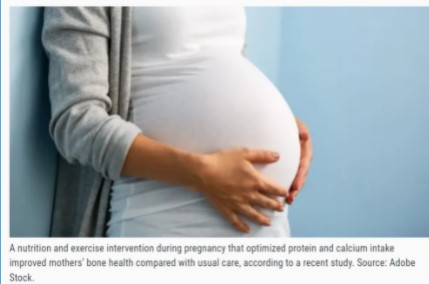News
Higher dairy intake during pregnancy maintains bone formation

Bone metabolism has been known to change during pregnancy and postpartum as the body accommodates “the increased nutrient demands for fetal and infant skeletal formation,” researchers wrote. Typically, mothers face a transient bone loss of about 2% of whole body bone mineral content during pregnancy due to maternal bone mineral mobilization. Up to 6 months postpartum, “mobilization of maternal skeleton occurs in association with lactation, leading to a transient loss of between five to seven percent of bone mineral density at the lumbar spine,” researchers wrote.
A nutrition and exercise intervention during pregnancy that optimized protein and calcium intake improved mothers’ bone health compared with usual care, according to a recent study. Source: Adobe Stock.
Previous studies have investigated the effects of supplements like calcium or vitamin D, but less is known about how dairy intake affects bone health during pregnancy and postpartum. Maude Perreault, RD, PhD, a registered dietitian and postdoctoral researcher at the University of Guelph, and colleagues analyzed data from a randomized controlled trial to assess how a personalized nutrition and exercise intervention during pregnancy might impact maternal calciotropic and bone biomarker profiles during pregnancy and the postpartum period.
For the study, 187 participants were randomly assigned in a 1:1 ratio to receive typical care or an individualized high-dairy protein diet and exercise plan, which began between 12 and 17 weeks of gestation and continued to delivery.
The goal of the exercise component of the intervention was to walk 10,000 steps daily, including four 40-minute walks each week. For the dietary component, a nutritionist worked with the participants on their goals, assisting with diet plans and providing recipes. Goals included a target protein intake of 25%, of which 50% came from dairy foods like milk, cottage cheese and yogurt.
At mid-pregnancy and the end of pregnancy, people in the intervention group consumed more total protein (P < .0001) and protein from dairy products (P < .0001) compared with those in the usual care group, according to Perreault and colleagues. This trend continued after delivery. At 6 months postpartum, the researchers found that people in the intervention group continued to consume higher amounts of protein from dairy foods (P < .02).
When it came to calcium, people in the intervention group consumed higher amounts during mid-pregnancy and at the end of it (P < .0001). Nearly all participants — 99% — achieved the estimated average requirement for calcium, “but this was not sustained at 6 months postpartum,” Perreault and colleagues wrote.
At the end of pregnancy, the researchers found that participants in the intervention group had significantly lower serum C-terminal telopeptide of type 1 collagen (bone resorption). In addition, these participants experienced a significant increase in serum concentrations of total procollagen type 1N-terminal propeptide (bone formation) from early pregnancy to 6 months postpartum.
The researchers reported that “the relative contribution of the nutrition versus the walking exercise component of the intervention in modulating the bone biomarker outcomes is not easily decipherable.”
This is partly because, throughout pregnancy, daily step counts were similar in both the control and intervention groups at about 4,800 to 6,300 steps per day. Because of this, the researchers wrote that the intervention “could be considered primarily a dietary intervention.”
“We can surmise that the higher protein and calcium intakes as observed in the intervention group, supported by adequate vitamin D status, played the major role in suppressing bone resorption and promoting bone formation,” the researchers wrote.
Although the exercise intervention was not significant, the researchers concluded that increased maternal intake of calcium and dietary protein maintained bone formation, minimized bone resorption, “and may protect bone health during pregnancy.”
CATEGORIES
LATEST NEWS
CONTACT US
Mobile:+86-18612182039
Tel:+86-029-85274126
Whatsapp:+8618612182039
Email:info@watarbio.com
Add:No. 12, Hongzhuan South Road, Yanta District, Xi’an 710061, China
